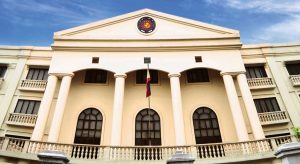THE Department of Budget and Management (DBM) is seeking to address government underspending by maximizing the opportunities for early procurement, Budget Secretary Amenah F. Pangandaman said on Monday.
Speaking in Congress during a budget hearing, Ms. Pangandaman said: “We have measures that could resolve the problem of underspending… These include the early release of allotments through the General Appropriations Act… which means that as early as Jan. 1, allotment orders are released so departments and agencies can implement their projects.”
“Because we have passed the New Government Procurement Act… at the submission of the National Expenditure Program, departments can now conduct early procurement activities short of award,” she added.
The government has a spending target of P5.754 trillion this year. The government has spent P2.257 trillion or 39.22% of the target as of the end of May.
The DBM is set to launch a pilot program to roll out modernized procurement this year, Ms. Pangandaman said, focused on common-use supplies needed by all agencies.
At the same hearing, National Economic and Development Authority (NEDA) Secretary Arsenio M. Balisacan said that an increase in cash grants to the poorest Filipinos will kick in starting 2026.
NEDA had recommended an increase of about P100 per cash benefit for the Pantawid Pamilyang Pilipino Program (4Ps), noting that the increases are needed to offset the effect of inflation on purchasing power.
“We have produced a study and adjustment of the grant for inflation to ensure that purchasing power of the grant when it was created would remain the same,” he said.
“All in all, it’s an increase from P2,850 to P3,550, and that takes care of the inflation adjustment,” he added.
A total of P114.2 billion was proposed by the executive branch to implement 4PS in 2025, according to a summary from the DBM.
Speaker and Leyte Rep. Ferdinand Martin G. Romualdez said in his opening speech before the budget hearing that budget allocations should be sustainable and strategic in order to produce economic benefits that are felt by ordinary people.
“To harness (the budget’s) full potential, we must adhere to three fundamental principles: fiscal discipline, strategic allocation, and operational efficiency,” he added.
The DBM last week submitted to the House of Representatives its proposed budget for 2025, proposing increased allocations to education, infrastructure, and defense.
The P6.352-trillion budget is equivalent to 22.1% of gross domestic product, and 10.1% higher than the P5.768-trillion budget this year.
Deputy Speaker and Quezon Rep. David C. Suarez told BusinessWorld that the proposed budget should seek to boost the quality of education to keep the Philippines regionally competitive.
“I’m very biased towards human development, so I want to see how the education funds will be utilized, especially with how our children have been performing compared to (the rest of) ASEAN,” he said.
The government is seeking to strengthen early childhood education, according to Mr. Balisacan’s presentation. Pupils need to have access to learning resources to improve the quality of education, it added. — Kenneth Christiane L. Basilio
